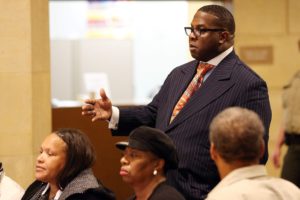45-year-old Linn County ministry is only of its kind in the state
Hundreds of people quietly working behind the scenes on behalf of Fresh Start Ministries can’t be easily labeled. Then again, neither can those who serve as the face of the organization, or those who rely on its services.
To be sure volunteers include local pastors and church members. But there are also social justice advocates and social workers. Some business leaders are part of the mix, as are elderly and other shut-ins throughout the area. Past and current members of law enforcement are present too. A few who were once recipients of the program’s outreach have come full circle and now work to help others. Many, but not all, are Christians.
I first became aware of the organization through a chance meeting. Board Secretary Jeff Scherrman and I were assigned to the same table at an unrelated charity event late last year. As we began to talk, we quickly discovered common ground and pledged to stay in contact.

The unexpected introduction and subsequent correspondence blossomed into a sit-down last week with additional board members and others passionate about the work of Fresh Start Ministries — work that all those gathered believe makes the whole of Linn County unique and better.
Fresh Start Ministries evolved from the Linn County Correctional Chaplaincy, which began in 1972. It serves as an umbrella organization for a host of programs that offer services ranging from direct ministry to county jail inmates and staff members to real-life, tangible supports for those exiting the correctional system.
The organization is focused on “rebuilding neighborhoods … one family at a time,” an acknowledgment that incarceration impacts more than the person being sentenced.
It’s a mission that Scherrman readily admits he didn’t always share. His perspective changed at a Fresh Start volunteer breakfast where several former inmates spoke about how the organization made a difference in their lives.
“I confess, I was taken by how intelligent these former inmates were — and ashamed of my general assumptions regarding (them),” Scherrman wrote in a letter to potential volunteers.
Linn County Jail Chaplain Dave Potter says such assumptions are common, even among the people he serves in the county jail.
One inmate — a woman in her 20s — has never truly experienced what most would consider a “normal” life. The adults that should have protected and loved her were instead her first abusers. From the time she was five or six, she was sold for sex.

“So many of the people I meet are broken. They need hope, and forgiveness. They need to be reminded that they have value,” Potter said, noting that his jailhouse services have been used by and are open to people of all faiths or no faith.
Potter, whose salary is paid by the county, is focused on jail inmates and staff members. Specially trained volunteers are also available to help in times of need or crisis, such as when an inmate is placed on suicide watch.
Each week a list of requests from the jail is compiled and circulated to about 80 area church congregants and shut-ins who have agreed to pray.
“It makes a difference when you know there is a group of people praying for you, or praying for your sick mother or child,” Potter said. Such knowledge contributes to the “calming effect” ministry advocates say is a by-product of their presence.
In-jail ministry services include one-on-one counseling, access to self-help and study materials and a weekly Bible service. Potter and other jail volunteers say their purpose isn’t to “hit people over the head with Jesus,” but to be living examples of the love and kindness portrayed in biblical teachings. A common scripture used to describe their work is Matthew 25:36, which is a portion of the “sheep and goats” parable, “I needed clothes and you clothed me, I was sick and you looked after me, I was in prison and you came to visit me.”
Jail chaplaincy is the oldest program under the Fresh Start umbrella, but far from the only one.
Donations and a grant have helped fund the Reintegration Initiative for Safety and Empowerment, or RISE Program. It offers a host of aftercare services that can begin up to a year before an inmate is released. Those released on probation can benefit from robust mentoring services, and many participate in “circles of support” that can help ease the process of re-entry into the community. I’ll explore the details of these programs, their challenges and needs, in future columns.
While the programs were designed to aid those who are in Linn County’s adult and juvenile detention facilities, volunteers have followed some inmates through their trials and remained in contact as those individuals were placed in state-run institutions.

The overarching goal of the program, from first to final contact, is intended to break the cycles that have led to incarceration, to help not only the individual but the community by easing transition from jail to freedom. When the process is successful, everyone benefits through reduction of crime, safer communities and taxpayer savings.
And while the group applauds a government shift toward justice reforms that offer shorter sentencing and earlier release, they’re also scrambling to address the subsequent increased need of their services. As an example, four houses of furniture and household goods were recently moved out of the group’s storage shed and into area starter homes. More temporary and emergency housing units are expected as Board President Rev. Dr. Damian Epps and his parishioners at Mount Zion Missionary Baptist Church embark on an initiative to purchase and rehabilitate properties. Throughout each program under the Fresh Start organization, volunteers as well as material and monetary donations are needed.
“We’re here — we’re existing, but we’re going to need help to match the increased demand and to thrive,” Scherrman said.
When you stack everything together, this year’s operating budget is roughly $87,000, with the vast majority stemming from church and private donations.
That’s a small price tag for an organization that aims to meet people where they are — spiritually, emotionally, physically and mentally — and guide them onto a path of successful rehabilitation and community integration.
This column by Lynda Waddington originally published in The Gazette on February 19, 2017. Photo credits: Stephen Mally & Liz Martin, both with The Gazette
